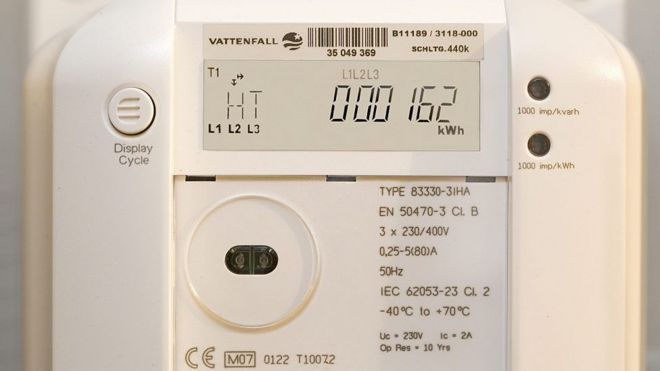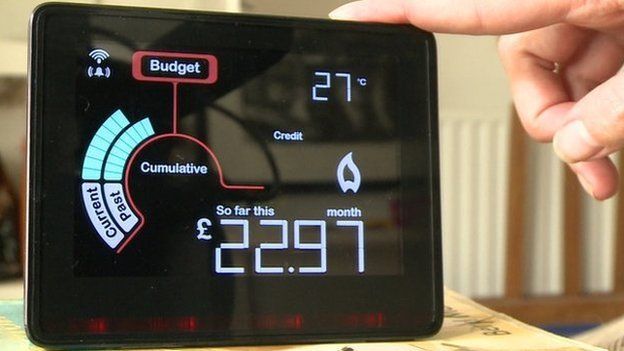Smart meters to cut energy bills by just £11, say MPs

Customers who get smart meters installed are expected to save just £11 a year off their energy bills, a group of MPs has found.
It was originally thought that the new meters would save consumers at least £26.
In one of the most critical reports yet on the £11bn programme, the MPs also said the government was now likely to miss its own deadline.
As many as 53 million of them are due to be installed by the end of 2020.
Grant Shapps, the chair of the British Infrastructure Group of Parliamentarians (BIG), said the programme had been "plagued by repeated delays and cost increases, with suppliers now almost certain to miss the 2020 deadline, and programme benefits likely to be slashed even further."
The government said smart meters were putting consumers in control of their energy use, and were already benefiting millions of homes and small businesses across Great Britain.
Smart Energy GB, which is promoting the roll out of the smart meters, said: "All smart meters mean an end to estimated billing and give people a greater understanding of their energy use.
"Smart meters are also making prepay cheaper and more convenient, bringing the way we pay for our energy up-to-date, enabling customers to top up online or over the phone."
Customers have financed the smart meter programme by paying a levy on their energy bills, while suppliers have frequently blamed the levy for rising costs.
However the report claimed most of the eventual savings would be made by energy firms, rather than consumers.
"The roll-out is consequently at serious risk of becoming yet another large scale public infrastructure project delivered well over time and budget, and which fails to provide energy customers with a meaningful return on their investment," said Mr Shapps.
'Going dumb'
The MPs also said some suppliers had been engaging in "scare tactics" to convince customers to have a meter installed, in order for targets to be reached.
Such tactics included firms telling customers that their bills would go up unless they agreed to have a meter, or that their old meter was dangerous.

The report also said that:
- Obsolete meters, which don't always work when a customer switches supplier, will continue to be rolled out until next year
- More than half of smart meters "go dumb" after switching, meaning they stop communicating with the supplier
- Up to 10% of smart meters don't work, because they are in areas where mobile phone signals are not strong enough
- By the end of the year only 22% of households will have the meters installed, meaning the 2020 deadline is certain to be missed
- The eventual cost of the programme could even outweigh the benefits
The MPs said the government should now plan for the roll-out to be completed by 2022, and that supply of the new generation of smart meters should be sped up.
They also said customers should be automatically compensated for each day their meter malfunctions.
Response
The report was signed by 92 MPs.
However the government said it was wrong to call dumb meters "obsolete".
"It's simply wrong to say first-generation meters are 'obsolete' as they offer smart services now and will continue do so as they are enrolled into the smart metering network, " said a spokesperson for the Business and Energy Department.
"However we welcome ideas on how to ensure the ongoing success of the smart meter roll out and are already working with Ofgem on issues raised in the report."
The National Audit Office is already investigating the economic case for the roll-out of smart meters, and is due to report sometime this summer.
Comments
Post a Comment